This Fowl Friday, we have something new to share. Last week we were half crazed moving our chickens around the property. The hens moved out to their new coop in the gardens, and the chicks finally took up residence in the main coop. There was a reason why all that happened by last Friday. It turns out we’re not done with baby poultry here.
Meet one of the new brood!
For the past few weeks we’ve been chatting with a friend who hatched more baby turkeys this year than expected. The idea was thrown around about adding a few turkeys to our farm, and last Saturday we decided to bring four turkey poults here to Curbstone Valley.
These turkeys were hatched April 10th, and are just now 6 weeks old. These are not purebred birds, although their parents were. The lighter reddish toned birds are Bourbon Red crossed with Royal Palm. The brown birds are Bourbon Red, Standard Bronze crosses. We won’t be sure for a couple of weeks what we have in the way of males versus females…although we have our suspicions.
Choosing to raise turkeys was not something we rushed into though. We’ve thought about this seriously for the past few weeks. We already have a lot of projects going on here, and wanted to be sure we could meet the turkeys needs here. We’d need to build secure housing, at least while they’re small, as we currently have nesting hawks and owls on the property, and this will take time away from the 101 other chores we need to take care of.
Turkeys primarily are raised either as meat birds, or occasionally as backyard pets. Although they can lay eggs for a few months in spring, they are not nearly as prolific egg layers as chickens, and so not typically kept for egg production. If we decided to get turkeys, what would we do with them?
We decided to give raising turkeys a try, but know that it’s not for everyone, and yes, one of them at least is destined for the table. We realize that may ruffle a few feathers, but for us we recognize that every year, millions of turkeys are raised commercially, and distributed across the United States for the holiday table. Most of us don’t look beyond the sanitary wrapping and sell-by dates. If we’d buy a turkey, then why not raise our own?
The more we have been producing our own food, and supporting local farmers by shopping for our food locally, the more we question where all of our food comes from. We don’t eat much meat by choice, however, the meat we do eat we now prefer to only source from local farms, that humanely raise their livestock. Yes the meat is more expensive, but with good reason and worth the difference in price for improved flavor, and the knowledge that the animals were raised with care and compassion.
Without getting too graphic, or political, the conditions under which the majority of commercial turkeys are raised, and the conditions the humans that work with them have to endure, are enough to make most of us want to skip straight to dessert on Thanksgiving.
However, it wasn’t all that long ago, that the responsibility of raising our food was our own, and what we didn’t grow ourselves, was grown by our neighbors. Over the last Century or so we’ve all become very removed from our sources of food, as that food has become more convenient and readily available. As gardeners, we appreciate the care and effort required to raise our salads, or tomatoes or fresh fruits. But what about the rest of our diet?
I’ll be honest, I do admit to stuttering a little in making our decision to raise turkeys, and not leaping at the idea, but I also recognize that I live in a part of the world where raising my own food is a choice, rather than a necessity.
So here it is, our great experiment. One certainly cannot be more locavore than raising one’s own Thanksgiving dinner. The reality is, if I’m going to look forward to a holiday meal, knowing that our Turkey had a good life, was raised with care, with a wonderful diet, out in the sunshine and green grass, means it will be one of the few on any Thanksgiving table that can claim that.
It won’t be easy…it’s not meant to be, nor should it be. The problem is, at this age, they’re rather inquisitive, and adorable.

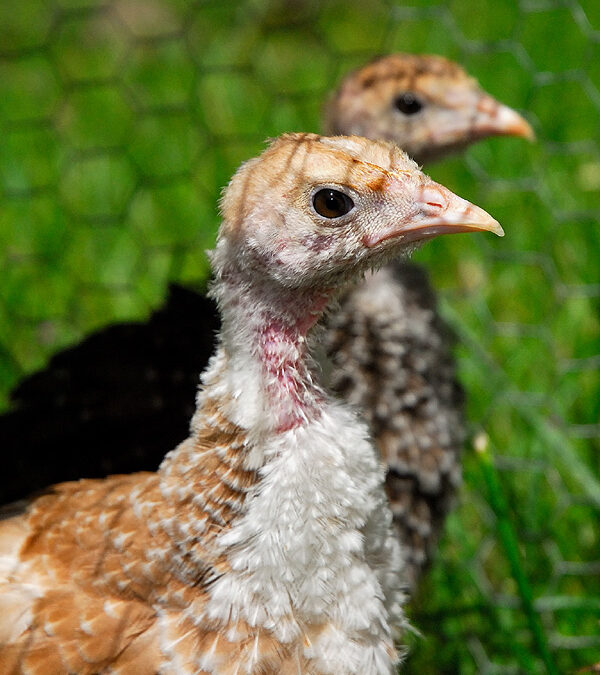
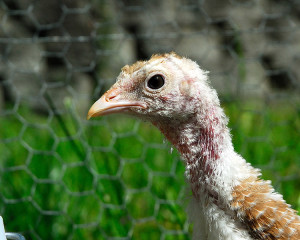
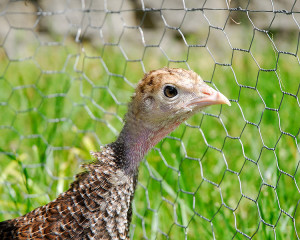
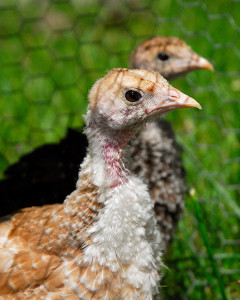
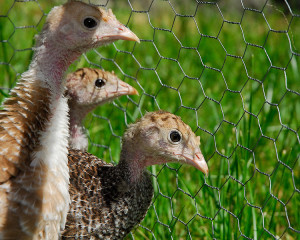
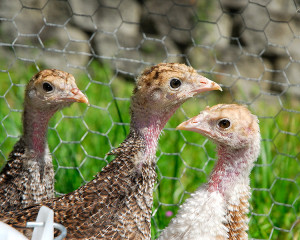
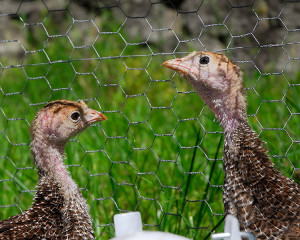


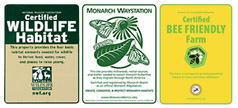




Good luck with the new birds….I know my 2 girls love all the little videos of the chicks, it was even questioned (and quickly subdued) about have our own around the house… not something I’m ready to get into. Just getting the hang of getting the right things planted at the right times in our little (stress little) garden. But the girls enjoy it and learn from it so it is worth it…..
Are you sure you don’t want chickens Tom? 😛 Just kidding. I don’t doubt the girls would love them, but they are a responsibility, and you have the extra added bonus of snow in the winter, which we don’t have to worry about with our chickens. That can’t make chicken keeping a little more complicated.
I appreciate your thoughtful analysis. If they’re as sociable and appealing as my friend Tom Terrific the Naragansett turkey, you may be having a vegetarian TDay after all.
.-= Daffodil Planter´s last blog ..Episode 2: Love blooms in Asheville, North Carolina =-.
That’s why we’re just dunking our toes into turkey rearing at the moment, and only have four. Just in case we lose our bottle on the big day 😛
Well, I think it’s great you’ve taken in the new lodgers. A turkey is part of our poultry CSA we joined, and we’re looking forward to a local, pastured bird for our Thanksgiving. It’s part of our move to eliminate CAFO meat from our diet.
Of course, I look forward to seeing yours grow. Kudos to you.
.-= villager´s last blog ..New Residents =-.
That’s a nice CSA! Some of the bigger CSA’s here provide meat or eggs, and some even occasionally have fresh baked bread. We’re with you eliminating CAFO meat from our diets too.
wonderful additons Clare but I wonder if one of them will finally end up as the maincourse at Thanksgiving.
Have a lovely weekend
I’m so excited for you! We want to get turkeys next year for meat. I find that the animals we have that have remained nameless would be the easiest ones for me to eat. I don’t know what it is about names? Turkeys are specifically banned in our city (along with hogs, but I’m not interested in raising them), but guess what? I don’t care! Ha ha! I look forward to reading about them.
.-= Dog Island Farm´s last blog ..Friday’s Gardening Tips – How to Install Irrigation =-.
I think when we name our animals, we have more tendency to anthropomorphize, projecting our own emotions on them. Definitely no names here.
I think it is an important lesson to know where our food comes from and how it is produced, having aid that it sure is allot easier popping down to the shop (never tastes the same though)
I have wild turkeys here, and I often enjoy the antics of the chicks when their mothers bring them around. One year, I looked out the kitchen window to discover a turkey hen and eleven chicks so young that they weren’t very good at walking yet; they would lurch/run forward a few steps and then pitch forward onto their beaks. They were, indeed, adorable. I share your locavore philosophy. I think one of Barbara Kingsolver’s rules in “Animal, Vegetable, Miracle” is to never name animals that you intend to harvest for food.
.-= Jean´s last blog ..Wordless Wednesday: Determination =-.
My grandmother had the same rule. I announced (when I was 5 or 6) over Sunday dinner, that I wanted to be a vegetarian. My grandmother was mortified, and immediately gave me a lecture on food and farming, along with the rule that “if you don’t name it…”…I think it’s a good rule 😉
Oh, boy, I still remember the story my mother told me of her pet turkey becoming Thanksgiving dinner one year! Whatever you do, don’t give them names!
.-= debsgarden´s last blog ..Hydrangea ‘Lady in Red’ =-.
Hi CV, lovely to see your new residents! Your point is well made about thinking more closely about where our food comes from. I would give dinner much more careful consideration if I was caring for it before it reached the plate.
.-= Heidi (GippyGardener)´s last blog ..My Garden Bouquet (MGB) for May =-.
They look very inquisitive as you said. They must be thinking…hey guys we came to the right place!
I admire how you run things at CVF and I’m looking forward to more turkey posts.
.-= Amy/GoAwayImGardening´s last blog ..Bright Bloomers =-.
Turkeys too? You definitely will have a full farm. Sounds great though. And happily raised turkeys sounds like a much better meal than most of what we put into our bodies. And let’s be honest, how many people will keep turkeys as pets? By raising them for food, you help ensure the survival of the species if not the individual turkey. Alot of disappearing heirloom breeds are making a comeback because they are becoming popular at the dinner table again.
.-= Brad´s last blog ..Modern corporate garden in Emeryville =-.
Well, you could always name one T-Dinner and one X-Dinner.
I agree with you, it’s complicated. I myself have sort of lost interest in meat, but partly because of how commercial farming is done. However, vegetarians who think they’re living a life in which they harm noone are fooling themselves. I appreciate that you’re willing to look reality right into its eyes.
So great that you’re now raising turkeys and I really admire your dedication to the principals and practices of organic, sustainable farming. I’ve been contemplating buying some hens for some time now, but being the squeamish anthropomorphizer that I am, they would probably end up as pets with names like Sally Mae or Mabel, and good for eggs only, not as Coq Au Vin (much to my hubby’s chagrin)
.-= Camissonia´s last blog ..Treks on the Santa Rosa Plateau: Vernal Pool Trail (DOWNINGIAS!!) =-.
Ah see…we don’t eat our hens. Truth is, hens, when done laying, wouldn’t be much good for meat anyway. Stock maybe…but they’d be a bit tough for much else. Our hens are pets, they lay eggs, and after their prime egg laying days are over, they still help out around the gardens. They eat all sorts of bugs, and you can’t beat home-grown high-nitrogen garden fertilizer either! That’s why we had to build a ‘retirement coop’ for the old gals, ‘Babs’, ‘Ginger’, and ‘Sweet Pea’…they more than earned it!
The turkeys however, at least until after Thanksgiving, will remain nameless ;P
Clare, I think the love and care those little guys will get from living with you is profoundly in contrast to how our food industry raises turkeys or any other animal. I so respect people who raise their own food with compassion and care. I think it is fabulous that we are reclaiming our food from the inhumane and poisonous conditions farm factories have created. I love your videos! I look forward to seeing how many gals you have there.
.-= Carol´s last blog ..Returning Fullness of Green Bedecked in Bold Orange and Black! =-.
Thanks Carol! I know that not everyone can do this, nor would everyone want to. We don’t eat much meat, but I know I’d buy a turkey at Thanksgiving, and we are in a situation to raise our own. I feel somehow that I should at least try. Factory farming makes me rather ill. If nothing else, our turkeys have lots of space, and see the sunshine everyday! We’ll see how these four do…we’ve never raised turkeys before. We’ve already discovered that they can be rather noisy! Good thing our neighbors aren’t too close 😛
Oh, what another fun adventure. I can’t wait to see them grow.
I heard a story about a little girl who did not want their pet chickens used for dinner. So, the mom kept an empty Foster Farms chicken wrapper and would bring it out onto the counter each time she would take a chicken from their large flock for dinner 😉
.-= Noelle / azplantlady´s last blog ..An Orange Monday Morning…. =-.
Oh, that’s rather clever. I remember as a child that the concept of eating an animal, especially one I was familiar with, was rather abhorrent. From their perspective, at least the FF wrapper gave the chicken some anonymity.
Have you read Farm City? It tells the tale of an urban farmer raising chickens, ducks, turkeys, pigs and butchering them herself. I thought it really confronted the squeamishness us modern folk have regarding the food we eat and how it gets to the table. Here’s a link to a review I did: http://idoradesign.blogspot.com/2009/11/book-review-farm-city-by-novella.html
And congrats! Turkeys are such an exciting addition!
.-= Christine´s last blog ..What’s For Dinner? Aphids? Again?! =-.
I actually haven’t read the book, although I keep meaning to. Thanks for the link, it’s a good reminder that I need to bump it up on my reading list! My grandmother would think I was a wuss for even hesitating on raising turkeys. She wouldn’t have even blinked, but she was a housewife during WWII, and meat was something of a luxury for a while…and not even quality meat at that. Few of us have really experienced that sort of hardship in regards to the availability of everyday food. It’s interesting how our culture and attitudes have shifted over time.
A few years ago, when the Cooper’s Hawks were still nesting along the border of our complex, I spied a female wild turkey walking away from a pile of rocks with a half dozen or more fluffy chicks waddling behind her. Down the hill, straight towards the hawks’ nest. Nobody ever saw the young ones again.
I would add this to your reasons for buying or eating the more expensive humanely and locally raised “animal products”. Nutrition! and fewer stress hormones. Give em what they need to be happy and healthy and they’ll return the favor!
No feathers ruffled here! The farmer who ran the CSA we belonged to last year raised heritage breed turkeys, but we couldn’t even get on the list for them in the two years we’ll be here before F. graduates. That’s how many people are trying to buy local, healthy, organic, old-breed turkeys now — which is so encouraging to realize. But rest assured, none of those turkeys were remotely cute come October. In fact, some of them were horribly ugly — and loud. You may be glad for the peace and quiet afterward. 🙂
I know it will be tough to slaughter one for meat. F. and I have discussed this a bunch, because we do eat meat (as much of it as possible locally and humanely raised, usually from farms we’ve seen and gotten to know), and if we had the land and money we’d like to raise at the very least our own chickens, and possibly a few heritage pigs. He grew up with the experience of slaughtering these animals by hand, as it was part of his culture — while the very idea generally makes me squeamish, which F. finds strange since I do, after all, eat the result.
.-= Meredith´s last blog ..star stuff =-.
I’m in LOVE with your turkeys! Good on you for taking this step. I’m not at the level that I could actually slaughter an animal, but I might be there someday, hopefully. These turkeys are some of the luckiest in the world. I shutter to think about the other 99% of turkeys raised in this country.
.-= Jackie´s last blog ..I got chicks! =-.